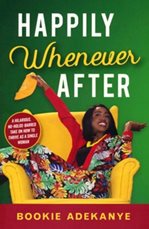The Oshawa author of an award-winning inspirational (and humorous!) book on singleness reflects on settling in Canada.
I arrived at Frankfurt International Airport in the early hours of October 29, 2019. For the first time in my life I was leaving my former Nigerian home with no return date in mind. While waiting to board an Air Canada flight, I met a lady who was also moving to Canada as a permanent resident.
“How do you feel about becoming an immigrant?” I asked
“Hmm.... that has never crossed my mind. That word “immigrant” makes me uncomfortable. ” It was a moment of reflection for her.
Canada in the last few hundred years has opened its doors to millions of people. Recently about 500,000 immigrants per year have moved to Canada – one of the highest rates per population of any country in the world. As of 2022, roughly 20 per cent of the Canadian population are immigrants.
People migrate to Canada for different reasons – war, natural disaster, persecution or to seek greener pastures. For most immigrants, moving to Canada is an invitation to live, work and become citizens of one of the safest, most peaceful and most progressive countries.
The immigrant’s experience
At its best the word immigrant carries a subtle connotation of being second-class – a reminder that you came to another person's space. This perhaps explains why my airport acquaintance was hesitant about the immigrant label.
Moving to a new country means leaving behind the life you're used to, relationships, networks, years of professional work and relevance. It could take decades for an immigrant to integrate into a new country.
A friend put it like this: "As an immigrant, you really don't belong anywhere. You're too foreign to be Canadian, and too Canadian to fit in your country of origin." Most immigrants are suddenly aware of things that didn't count in their country that are now major differentiators for them in Canada – race, accent, communication style, social stereotypes, personal space, religious beliefs and world view.
This awareness could result in an erosion of an immigrant's self-confidence and heighten their feeling of being out of place. The inability of the immigrant to blend in also portends economic, social and political disadvantages for them. A 2008 report by Statistics Canada shows that immigrants are more likely to take jobs below their qualification, are more likely to self-efface, and live below their potential.
How do we approach difference?
Nava Israel, a cultural competence expert in Toronto, uses the Smoothie vs Salad analogy to highlight different approaches to integrating into a new society.
The Smoothie takes a hyper-integration approach where everyone is expected to blend into a monolithic society and fit into a prescribed mold. However, this is unrealistic as individuals are products of the cultures and environment from which they evolved.
The Salad approach embraces the uniqueness of each individual as they coexist without losing their distinct attributes or identity. Difference is a lever for innovation and should be embraced in a country like Canada that celebrates diversity and pushes for inclusion.
The question of identity
Throughout biblical history and world history, immigration is a common phenomenon. People migrated in response to God's instruction, due to famine, war or even human trafficking, like in Joseph's story recorded in Genesis 37. Reasons for migration are almost the same today as then.
Irrespective of the cause of immigration, God's instruction to His people was consistent – they were to retain their Identity. Every creature has unique attributes that represent a piece of a grand puzzle, and when it all comes together, gives full expression to God's image.
"So God created human beings in his image. In the image of God, he created them; male and female he created them" Genesis 1:27 (NLT).
Nations, tribes and people
In fall 2021, walking down University Avenue in downtown Toronto became the highlight of my week. We had just come out of a series of Covid-19 lockdowns that had meant being holed-up for several months with minimal human interactions.
It wasn't just the bustling crowd that lit up my soul, it was its composition – people of every race. Perhaps some of them or some of their ancestors had packed a bag to move to Canada at some point.
It felt like a peek preview into the final state of humanity when we come into oneness in God as depicted in Revelation 7:9 (NLT):
“After this I saw a vast crowd, too great to count, from every nation and tribe and people and language, standing in front of the throne and before the Lamb. They were clothed in white robes and held palm branches in their hands.”
Bookie Adekanye of Oshawa, Ont., is the author of Happily Whenever After (Oasis, 2022), a humorous, inspirational book about singleness and purpose. Learn more at HappilyWheneverAfter.com.